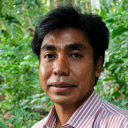The politics of peat and fire
On a recent visit to Riau, a province on Indonesia’s island of Sumatra, Indonesian President Joko Widodo surveyed the damage from this year’s peat and forest fires and the resulting haze that has blanketed parts of Southeast Asia. As in previous years, the haze from the burning peat has triggered health concerns and cross-border tensions in neighboring Singapore and Malaysia.
This year’s fires, that are mainly burning on the islands of Sumatra and Borneo, have highlighted the need for prevention, especially at sub-national levels. During his visit to Riau, President Widodo called on local leaders and administrators to work with communities in affected areas to monitor and prevent fires. Better measures to monitor and quickly react would likely have helped mitigate the effects of the fires, some of which may have been ignited for land clearing and other purposes.
Considering the “vast scale” of the fires, unidentified groups or individuals may have organized and started them intentionally, Widodo said, adding that he has instructed police to investigate. Fires are sometimes due to organized crime that benefit some individuals but at a high cost to many others, said CIFOR Scientist Herry Purnomo, citing his research published in 2017 that investigated the role of organized crime in peatland and forest fires.
The Indonesian president’s emphasis on fire prevention, honed after the damaging 2015 fires during which 43 million people suffered the effects of air pollutants, is aligned with best practices highlighted by researchers working on the political economy of fires in peatlands and forests. Working with local governments to ensure best practices in fire management, using geospatial analyses such as the Center for International Forestry Research’s Borneo map and building plans for replanting peatlands are among the solutions to tackle fires in peatlands identified by researchers to reduce fires.
“Investing in prevention measures is the single most important factor in controlling fires,” said Purnomo. Local governments are the most capable institutions to reduce fire in palm oil plantations. However, it should be done in the early phases of their development, he said.
“Political funding of local elections for heads of districts and regencies has a significant correlation to fire occurrence in 2001-2017,” Purnomo said. The results of this research will be published in the International Forestry Review journal. Land politics, weakening of laws related to influencing voters and debt-for-gratitude among political leaders are sometimes part of local democratic elections, he added.

As fires burn across the Indonesian archipelago, many other regions from the Amazon to the Arctic are also suffering this year from devastating burning that has released carbon dioxide into the atmosphere. Other impacts from fires includes health risks and economic damage.
Investing in prevention measures is the single most important factor in controlling fires.
“Instead of focusing our attention on fires that have already started, we would be better off paying more attention to prevention,” wrote CIFOR Director General Robert Nasi in a recent op-ed published by the Thomson Reuters Foundation. “Mismanagement and failure to prevent such a critical resource puts the livelihoods of hundreds of millions of people at risk.”
To learn more about fires and forestry, please find the following publications from the CIFOR library:
We want you to share Forests News content, which is licensed under Creative Commons Attribution-NonCommercial-ShareAlike 4.0 International (CC BY-NC-SA 4.0). This means you are free to redistribute our material for non-commercial purposes. All we ask is that you give Forests News appropriate credit and link to the original Forests News content, indicate if changes were made, and distribute your contributions under the same Creative Commons license. You must notify Forests News if you repost, reprint or reuse our materials by contacting forestsnews@cifor-icraf.org.













